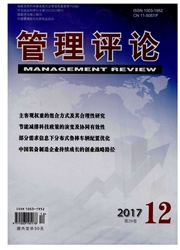

 中文摘要:
中文摘要:
本文以资源保存理论为切入点,考察辱虐管理对工作绩效的影响,探讨心理痛苦的中介作用和心理资本的调节作用。采用问卷调查法对于110家不同企业的员工开展调查,最终共得到有效问卷356份。通过采用多元回归分析、验证性因素分析和中介调节模型等方法,统计结果支持了研究假设。研究结果发现辱虐管理对心理痛苦有显著的正向作用,对工作绩效有显著的负向作用;心理痛苦中介了辱虐管理和工作绩效之间的关系;心理资本调节了辱虐管理对心理痛苦的作用,心理资本越高,辱虐管理对心理痛苦的正向影响越弱。另外,心理资本也调节了辱虐管理通过心理痛苦对工作绩效的间接影响,心理资本越高,心理痛苦的中介作用越弱。
 英文摘要:
英文摘要:
Researches into the leadership style have always been a major concern of academic world, because different leadership styles have different impact on the employees and the organizations and also the influence can be positive and negative under different circumstances. Abusive supervisors as a type of destructive leaders have been a focus of academic research these years, and researchers are trying to figure out how the mechanism works and in what ways we can do to alleviate the adverse effect abusive supervision has on employees and the organization. However, the mechanism underlying such process is still unclear. Therefore, this study aims to fill the gap, from psychological perspective, by investigating the mediating effect of mental distress and moderating effect of psychological capital. We collect data from 356 employees from 110 different organizations in China. We use established measures to capture key variables in this study. The reliabilities of all scales are above 0.70. Multiple regression, confirmatory factor analysis and moderated mediation model are employed to analyze data. Confirmatory factor analysis indicates the four key variables are discriminated. Regression analysis shows that abusive supervision is negatively associated with job performance, and the relationship is partially mediated by mental distress. In addition, psychological capital moderates the relationship between abusive supervision and mental distress in that the relationship is morepositive and stronger when subordinates' psychological capital is low. Moreover, moderated mediation analysis find that psychological capital moderates the indirect effect of abusive supervision on job performance via mental distress. Contributions, practical implications and limitations are discussed.
 同期刊论文项目
同期刊论文项目
 同项目期刊论文
同项目期刊论文
 Examining the cross-level relationship between shared leadership and learning in teams: Evidence fro
Examining the cross-level relationship between shared leadership and learning in teams: Evidence fro Big-five personality and BIS/BAS traits as predictors of career exploration: The mediation role of c
Big-five personality and BIS/BAS traits as predictors of career exploration: The mediation role of c There Are Lots of Big Fish in This Pond: The Role of Peer Overqualification on Task Significance, Pe
There Are Lots of Big Fish in This Pond: The Role of Peer Overqualification on Task Significance, Pe Detecting Insufficient Effort Responding with an Infrequency Scale: Evaluating Validity and Particip
Detecting Insufficient Effort Responding with an Infrequency Scale: Evaluating Validity and Particip 期刊信息
期刊信息
